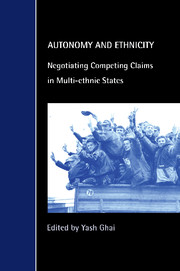Book contents
- Frontmatter
- Contents
- Acknowledgements
- List of Contributors
- 1 Ethnicity and Autonomy: A Framework for Analysis
- Part I Operating Autonomies
- 2 Federalism and Diversity in Canada
- 3 Federalism and Diversity in India
- 4 Autonomy Regimes in China: Coping with Ethnic and Economic Diversity
- 5 How the Centre Holds: Managing Claims for Regional and Ethnic Autonomy in a Democratic South Africa
- 6 Autonomous Communities and the Ethnic Settlement in Spain
- Part II Failed Autonomies
- Part III Seeking Autonomies
- List of Cases
- List of Legislation
- Index
6 - Autonomous Communities and the Ethnic Settlement in Spain
Published online by Cambridge University Press: 06 July 2010
- Frontmatter
- Contents
- Acknowledgements
- List of Contributors
- 1 Ethnicity and Autonomy: A Framework for Analysis
- Part I Operating Autonomies
- 2 Federalism and Diversity in Canada
- 3 Federalism and Diversity in India
- 4 Autonomy Regimes in China: Coping with Ethnic and Economic Diversity
- 5 How the Centre Holds: Managing Claims for Regional and Ethnic Autonomy in a Democratic South Africa
- 6 Autonomous Communities and the Ethnic Settlement in Spain
- Part II Failed Autonomies
- Part III Seeking Autonomies
- List of Cases
- List of Legislation
- Index
Summary
Of many recent experiments in ethnic conflict management, Spain's has been one of the most successful. This success is due in part to the specific pattern of democratisation experienced by Spain since the late 1970s, finally enshrined in the new democratic constitution (December 1978).
Spanish nationalism can be understood as a response to peripheral nationalisms, at least as much as peripheral nationalism is a response to Spanish nationalism. Throughout this century, the bogey of ‘separatism’ has been used by Madrid elites to buttress centralism against any concessions to regionalism. In turn, intolerance of regional aspirations bred peripheral nationalism. However, the tension has slowly given shape to an interesting synthesis which attempts to bridge the gap between the two.
Since the nineteenth century, two forms of Spanish nationalism have competed: one espoused by Madrid's elites, the other by elites in Barcelona. One is rigidly centralist, the other concerned with carving out a space of autonomy for other regions. Basque nationalism, on the other hand, with its separatist program, simply opted out of the project of reconstructing Spain. I have argued elsewhere that the state played a major role in shaping both types of nationalism, although the internal dynamics of political elites were also important (Conversi 1997).
THE HISTORICAL BACKGROUND
The objective of a homogeneous Spain has competed with a pluralist vision of Spanishness since the beginning of the nineteenth century and both are part of a centuries-long political practice in which centralising attempts clashed with regional resistance.
- Type
- Chapter
- Information
- Autonomy and EthnicityNegotiating Competing Claims in Multi-Ethnic States, pp. 122 - 144Publisher: Cambridge University PressPrint publication year: 2000
- 9
- Cited by



